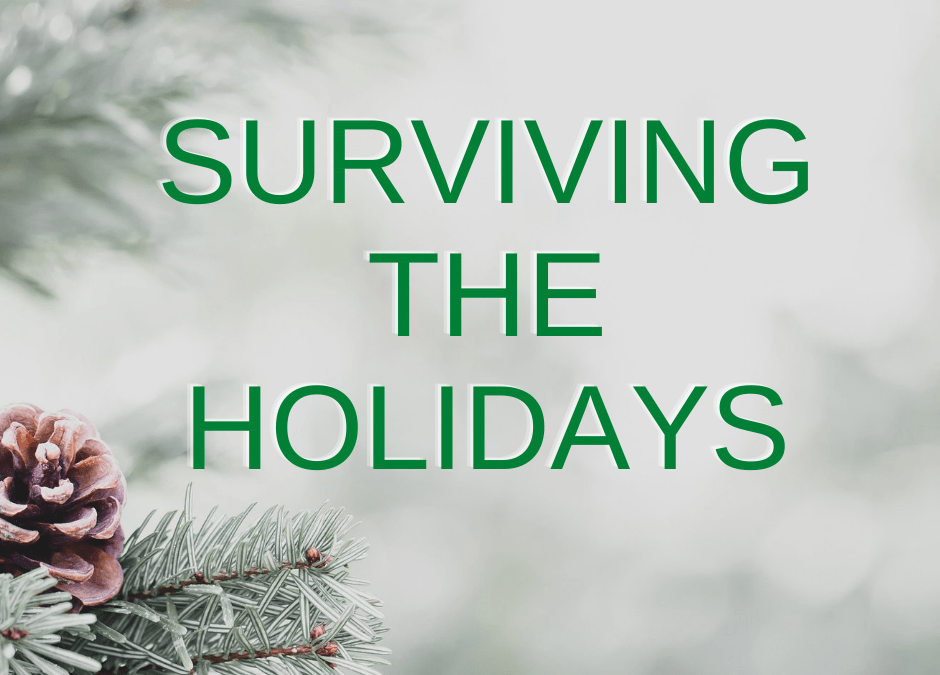When you have lost someone, facing the holidays is overwhelming. When my son Eric died, I dreaded the holidays – I tried to avoid them altogether. When we are bereaved by suicide, substance, or other forms of self-harm, the holidays are overshadowed by an intense sense of loss. The world seems to be celebrating with joy and merriment. But our world is in chaos, and we cannot imagine facing the holidays without people we love. We just want to run and hide away from everyone and everything.
This year will be my 8th holiday season without my sweet boy and I am reconciled to it. Once I realized I could give myself permission to celebrate life — including the holidays — I found ways to include Eric. My family stumbled through those first holidays with a mix of tears, sorrow, and profound grief. Over time we found ways to integrate the sweet sadness that Eric wasn’t with us with the joy that comes from celebrating the holidays with those we love on this earthly plane.
Here are some tips that have helped us survive the holidays:
- Accept the fact that the holidays will be different. You don’t have to do what you did before, do something different. Have breakfast instead of dinner, go on a vacation, go on a healing retreat, or do nothing at all. Whatever you do, seek comfort.
- Don’t be hard on yourself. Your emotions are unique to you. Others might not understand. Don’t judge yourself or set your expectations too high. Give your grieving self the permission to be who you are. Those you know who love you will understand and support you.
- Prepare to answer tough questions. You might be asked how you are doing. Be honest. Many people are looking for ways to support you. Share your thoughts and feelings in a loving way. If you don’t feel like talking, say: “thank you for asking, perhaps I can share more with you later.”
- Make a plan. As everyone is planning and preparing, think about what you would like to do. What new traditions will you try this year? Which old ones will you stop? How much shopping will you do? Will you prepare holiday meals? What about decorating? You may plan to do nothing at all – honor your desires and limitations. You may find new traditions that give you peace, hope, and joy.
- Ask for help. Reach out for help. People may want to help but are concerned about intruding or triggering you. Tell them what you need. Sharing your pain with others won’t make it go away, but it can make it more bearable. If you can muster the courage to ask for help, they can find ways to support you.
- Don’t feel guilty. Sometimes we feel guilty when we find ways to enjoy the holidays after loss. That is normal, but it is also normal to want to enjoy and celebrate the holidays. Give yourself permission to experience joy when you find it.
- Practice gratitude. Keep a journal of the things for which you are grateful. These could be the people who love and support you, the time you had with your lost loved one, your religious or spiritual communities, your family, your hobbies, hiking in nature, or simply reading a book. Gratitude helps to purge your pain and contribute to a feeling of well-being and grounding.
- Share memories. Remember your lost loved one. Say their name. Tell their stories and share memories. Celebrate their lives and keep them part of your holidays. Focus on who they are, not how they left us. Create a memory stocking, ask your friends to share a memory or photo in lieu of a gift, create a memory altar, light a candle, start a memory journal, or give someone in need a gift in the name of your loved one. Be creative!
- Prepare for grief bursts and triggers. Those beautiful memories can become triggers. Sometimes tears come at the most inopportune moments. Tears are just one way in which we express our sadness over our loss and are a key part of the healing process. You have the right to experience waves of grief. Just let them be. If you are around people, be honest and say something like “I am missing my child.” People will understand and support you. Anticipate triggers and give yourself permission to cry. Try to embrace your pain in small doses. This is part of the journey.
- Help others in need. Being of service to others can be key to our healing process. It refreshes the soul and helps us understand that peace and joy can be found even amid the worst pain. Consider volunteering or giving in a way that honors your loved one.
- Rely on your faith. Regardless of your religious beliefs, spiritual structure, or faith practice – there is something about the holiday season that can encourage a deeper engagement with spirituality. The holidays often spark a need for reflection, introspection, and perspective for spiritual exploration. I encourage you to find your spiritual footing by exploring your relationship with your higher power.
- Do not numb the pain. Many of us numb our pain by working too much, shopping too much, volunteering too much, cooking too much, drinking too much, and even abusing drugs or alcohol – all to distract us from feeling our pain. Avoiding our emotions only creates more sadness and isolation. Reach out to people in your community, our family and friends if you need help.
If you need support during the holidays, consider reaching out to a professional counselor or grief specialist. Many valuable resources exist for both in-person and online support. EricsHouse is here to support loss survivors all year long.
Our wish for each of you from those of us at EricsHouse is for a happy and hopeful Holiday Season. And always remember, grief and joy CAN exist at the same time.


